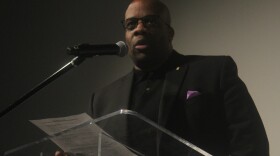A protest TARC workers planned for Friday afternoon was canceled after their agency’s new leader made a surprise visit to them.
ATU Local 1447, a union that represents the city’s bus transit employees, has been pushing for higher wages and safer working conditions to be guaranteed in employees’ new contracts. Their previous contracts expired at the end of August.
Union officials, who said 97% of employees rejected their leadership’s most recent contract offer, organized a vehicle protest from the agency’s headquarters to the office of TARC’s new acting board chair, Carla Dearing.
But that plan was shelved when Dearing arrived before their departure. She spoke with employees including bus drivers and maintenance workers for more than half an hour.
The workers discussed their grievances with current pay and safety, and how leadership has treated them since former executive director J. Barry Barker retired in 2018.
Dearing said she would look to make changes, and also promised to join employees in a solidarity drive, similar to what workers had planned on Friday, in the future. Contract negotiations are scheduled for November.
“This group organized this action because they wanted to be heard, and I came here to listen. I learned a lot. There are a lot of important issues, and it’s necessary right now to start to achieve what [workers are] talking about,” Dearing said.
Lillian Brent, the union’s president, said change is needed for both employees and riders.
“We’re hoping to improve the working conditions as far as, like, making this a safe environment. Not just for the employees here, but for the passengers, and to negotiate a fair contract to where I can look my members in the face and be proud of what is being offered,” Brent said.
Dearing became the agency’s acting board chair after John Launius recently resigned.
On Tuesday, Metro Council’s Government Oversight and Audit Committee decided to postpone until January its decision on whether to reappoint Dearing as TARC vice chair. It came after council members discussed concerns with the agency’s job performance, including difficulties riders have had with TARC3, its service for people with disabilities.







